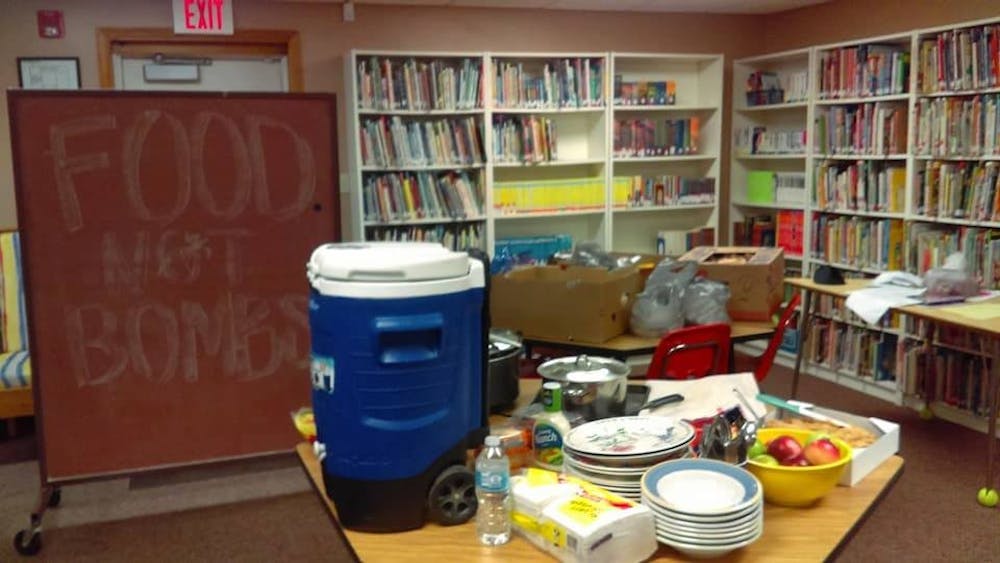Tables are set up. Some hold informational literature, while others have dishes and pans. A hot meal sits with bowls to one side, waiting to be served. Volunteers check for last-minute details as people begin to trickle in.
It’s 5 p.m. in Canan Commons, a public park in Muncie.
When organizers think about the work they do in the community, they said they don’t know how long it is going to last, but no one is worried about that. The night could bring 30 guests or none, but all that matters is the opportunity to share food with others and spread the word: food not bombs.
Members of the Muncie community have recently revived the once-active chapter of Food Not Bombs, and have invited everyone to share a meal at 5 p.m. every Sunday.
The group operates on the idea of mutual aid instead of charitable giving, and makes no distinction between themselves as volunteers and the community members who join them.
“We are the Muncie community. Most of our volunteers live, work and raise their families here,” said Nate Rose, one of the 25 volunteers for Muncie Food Not Bombs. “We have everyone from Ball State students to non-students who have lived here their whole lives. We are hoping to build lasting, long-term relationships with anyone who wants to work with us.”
Food Not Bombs started in Cambridge, Massachusetts, in 1980 when eight college-aged, antinuclear activists got together to protest the war peacefully. Today, according to the group’s findings, there are movements around the world sharing free vegan and vegetarian meals to people in more than 1,000 cities.
The original Muncie branch of Food Not Bombs started in the mid-2000s, but went dormant soon after. Recently, however, a few members from the original group were having a discussion and decided to revive Muncie’s Food Not Bombs.
After deciding Sundays would be its regular meeting time, Food Not Bombs had to decide which food to serve.
All of the food that Muncie’s Food Not Bombs serves is food that would otherwise go to waste. The group receives food from individual donations and garden surpluses, as well as supplies from stores and restaurants that they cannot sell and grocery stores’ stock that is edible, but marked for disposal.
According to the USDA, 27 percent of the total amount of food produced each year is lost at the retail and food service levels. This means the United States throws away about 263 million pounds of food every day that is edible, and Food Not Bombs hopes to reduce that number.
“Part of the message that Food Not Bombs hopes to get across is that rich countries like the United States throw out enough untouched, edible, non-expired food every day to feed every hungry person in the world,” said Morgan Aprill, a volunteer for Muncie’s Food Not Bombs. “Often, this is just for cosmetic reasons. Tomatoes that aren’t red enough, cans that are dented, etc. We use this excess food for our meals both to reduce waste and to show how abundant our resources truly are.”
One of the biggest goals of Muncie Food Not Bombs, the group said, is to show the world that there is not a scarcity as people would like to believe. Volunteers said they aim to “create a culture around the joy of sharing” this abundant food source.
Additionally, the group said it wants to remove the shame that often comes after receiving charity, because no one should be concerned with where their next meal comes from.
In 2016, the United States Census Bureau recorded that 12.7 percent or 40.1 million Americans lived in poverty, including 32 percent of citizens living in Muncie. It also recorded that Delaware County has the second-highest poverty rate in Indiana at 21.6 percent.
“There are no income tests or any other forms of gatekeeping and bureaucracy. We share our food, literature and company with anyone — rich or poor, drunk, high or sober,” Aprill said. “We don’t ask anyone to prove their poverty or residence, show us they receive SNAP benefits or give us a bill stub. We just share. Everybody needs food.”
Because Christmas Eve falls on a Sunday this year, the group has planned to keep their normal schedule while adding a few flares to the dinner, although specifics have yet to be determined.
The group has also been invited by Moth Danner, of the Muncie Makers Market, to set up a table with literature and hot beverages at the Light Up Downtown Christmas Event Thursday.
“We hope that people see what we’re doing, become part of it and get back some of their sense of self-determination and dignity when they recognize that they can be part of a positive, nonviolent social change,” Rose said. “It is a model that many have followed all over the world. It is a reaction to the immense waste and obscenity that is our current system. It is humans caring for other humans’ most basic need — hunger.”
Contact Tier Morrow with comments at tkmorrow@bsu.edu.




